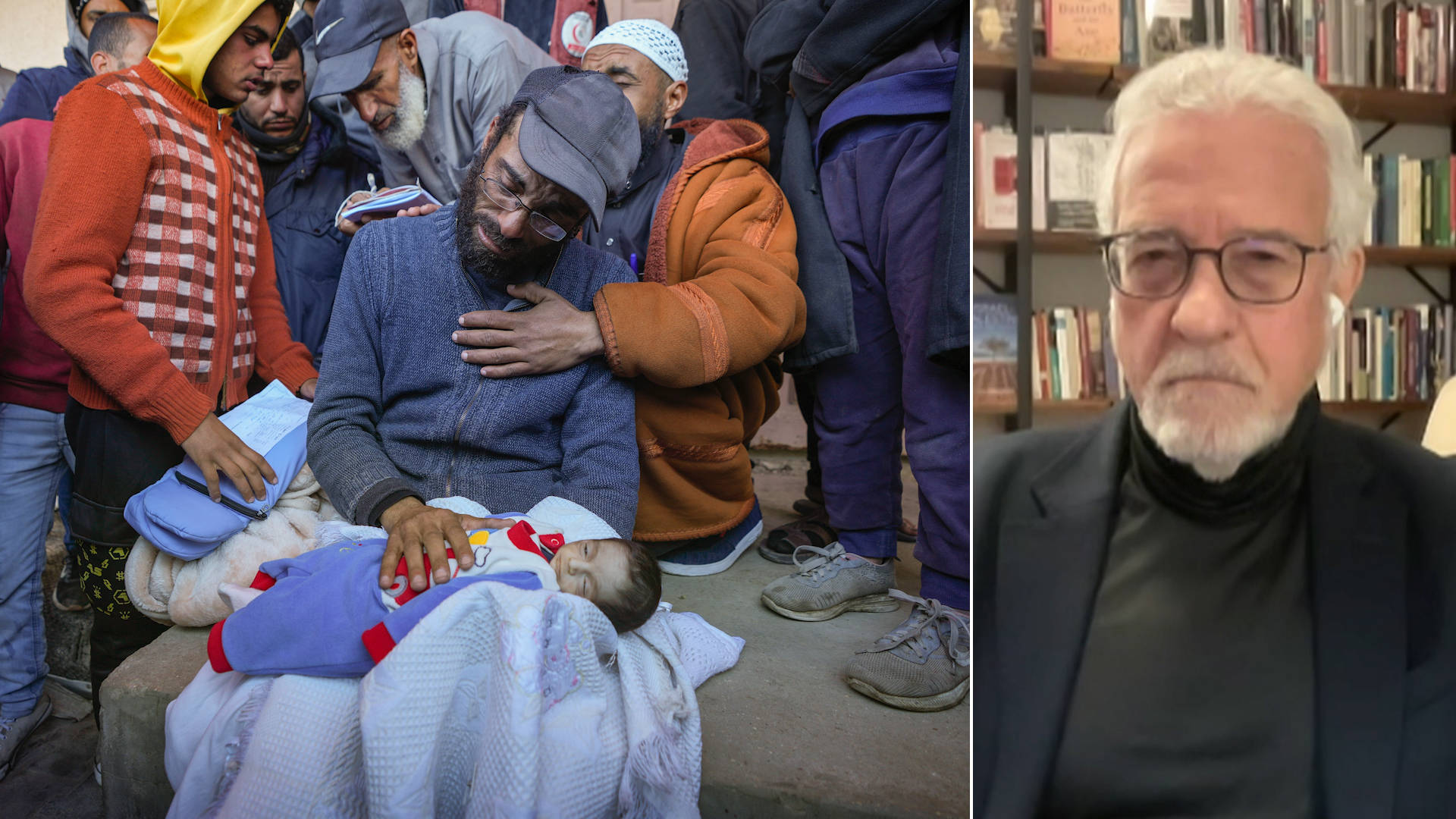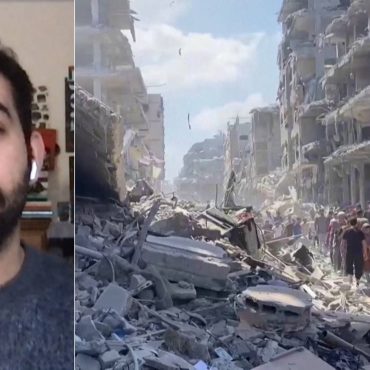This is a rush transcript. Copy may not be in its final form.
NERMEEN SHAIKH: This is Democracy Now!, democracynow.org, The War and Peace Report. I’m Nermeen Shaikh.
As 2024 winds down, new details from Gaza’s Health Ministry confirm more than 108,000 Palestinians have been injured in Israel’s onslaught since October 7th, 2023, and more than 45,500 killed — though the true toll is thought to be far higher. Meanwhile, Gaza’s officials continue to accuse Israel of deliberately blocking aid deliveries, and UNRWA has warned of a, quote, “approaching famine” in Gaza where residents face severe food insecurity.
This comes as thousands of Israelis protested against Prime Minister Benjamin Netanyahu’s government Saturday, demanding an end to the war in Gaza and a ceasefire that would bring home the hostages still held by Hamas.
Our next guest says Israel is carrying out a combination of, quote, “genocidal actions, ethnic cleansing and annexation of the Gaza Strip.” Omer Bartov is professor of Holocaust and genocide studies at Brown University. He’s an Israeli American scholar who’s been described by the United States Holocaust Memorial Museum as one of the world’s leading specialists on the subject of genocide. He was recently in Israel and just returned earlier this month.
Professor Bartov, welcome back to Democracy Now! If you could begin by explaining why you think now a genocide is occurring in Gaza?
OMER BARTOV: Yeah. Thank you for having me again. I just want to start by saying that I was listening to the interview with Dr. Abu-Sittah, and I’d just like to express my appreciation for all the work that he’s been doing and everything that he was saying in the previous segment.
I started, as you may know, already in November 2023, I published an op-ed in The New York Times where I wrote that I thought the IDF was carrying out what appeared to be war crimes and crimes against humanity, but I was not yet convinced that we had enough evidence that this was genocidal action. And my view changed really around May of 2024 with the decision of the IDF, despite opposition from the United States, to invade Rafah, the last area of the Gaza Strip that had not been taken over. There were about a million Palestinians there who had already been displaced several times, and the IDF displaced them one more time to the beach area, the Mawasi area, without any proper infrastructure at all, into tent cities along the beach, and then proceeded to demolish much of Rafah.
And it was at that point that I started looking back at the entire operation, starting with statements made at the very beginning, in October 7th, 8th, 9th, by Israeli leaders, political and military leaders with executive authority, who were saying that they wanted to flatten Gaza, destroy it, that there were no people who were uninvolved, and so forth. And it appeared at that point that there was actually a systematic attempt to make Gaza uninhabitable, as well as to destroy all institutions that make it possible for a group to sustain itself, not only physically but also culturally, its identity, its collective memory, which meant a systematic destruction of universities, of schools, of mosques, of museums and, of course, of housing and infrastructure. So, what you could see by then was that there was what we would call an urbicide, an attempt to destroy the urban centers, physically destroy them, a scholasticide — that is, killing of the members of the educational institutions, of schools, professors at universities, and so forth — so that the population, having been displaced many times and, as you heard before, vast numbers of them being killed, wounded and debilitated, would never be able to reconstitute itself as a group in that area. That’s the general drift of it.
Now, as of early October this year — that is, a year after the war began — the IDF started an operation in the northern part of Gaza, north of the so-called Netzarim Corridor, which is now not really a corridor — it’s like a box about five miles wide and five miles long — emptying that area north of that corridor entirely of its population. And this was a plan that was being sold by a retired Israeli general, Giora Eiland, on Israeli TV for months before. And the idea is to force the entire population out through military action and through starvation, through depriving the population of food and water. And much of the population has indeed been removed. This last attack on the hospital you were discussing earlier is one additional phase in this attempt to make this entire area empty of its population.
This has been called by the former Israeli chief of staff and minister of defense, who is himself a political hawk, on the Israeli media an operation of ethnic cleansing. But ethnic cleansing means that you move people from a place where you don’t want them, a particular ethnic group, to another place where they can be at least secure of those attacks. But, of course, in Gaza, when you move people from one place to another, to so-called safe zones, they are not safe there, and they do come increasingly and constantly again under attack. So, that’s what makes this so-called ethnic cleansing actually a part of a genocidal operation.
As for annexation, what we hear a lot now on the Israeli media is that as this northern third of Gaza is being flattened and emptied of its population, there are in fact settler groups waiting in the wings just across the fence to move in and to start settling that area, with an eye to occupying it entirely. And I don’t see — if they do that, once the army lets them in, I don’t see any mechanism in Israel itself or, frankly, internationally that would remove them from there. So, that would be the beginning of a creeping annexation and resettlement of Gaza as it is being emptied of its Palestinian population.
NERMEEN SHAIKH: Well, Professor Bartov, I want to ask about the enablers of this, as you say, genocide. In a Guardian piece last week headlined “A consensus is emerging: Israel is committing genocide in Gaza. Where is the action?” columnist Nesrine Malik condemns Western complicity in what’s occurring in Gaza, writing, quote, “The danger now is that Palestinians die twice, once in physical reality and second in a moral one where the powerful diminish the very standards that shape the world as we know it. By refusing even to accept the designations of genocide and ethnic cleansing, let alone act upon them, Israel’s allies force an adaptation on to the world after which it simply becomes accepted that rights are not bestowed by humanity, but by the parties who decide who is human.” So, that’s Nesrine Malik writing in The Guardian. Professor Bartov, could you respond to that? And in particular, a genocide, as you say, is occurring in Gaza. The genocide would not be possible without the complicity and direct involvement of Western powers, in particular the United States. So, in that sense, is the U.S. also, by association, guilty of committing genocide?
OMER BARTOV: Yes, look, I mean, I would begin by saying that, first and foremost, the population that is most responsible for what Israel is doing right now is the population of Israel and that there is a deep complicity of the Israeli population, including not only the government but opposition parties in Israel which are supporting the operation in Gaza. So, we can talk about that.
But, of course, Israel cannot and would not be able to continue its actions in Gaza without complete support, especially from the United States, also from European countries, Germany foremost, but also in many ways France and the U.K. The U.S. administration, under Biden, could have ended this war as early as November or December 2023, because Israel cannot conduct such operations on such a scale without constant assistance from the United States, first of all, by the vast amount of munitions that are going to Israel on a daily basis, tank and artillery shells, interceptor rockets. All of this is coming on a vast scale from the United States to the tune now of about $20 billion being paid by the American taxpayer. Had an American administration said to Netanyahu in December 2023, “You have to wrap this up, or you’re on your own,” he would have had to stop, because it would have simply been impossible. But instead, this was not done.
And the result of that is, obviously, first of all, the massive destruction of Gaza. Second, it means that the entire edifice of international law that was put into place in the wake of World War II and the Holocaust in order to prevent genocide ever happening again, through the Nuremberg tribunal, through the Genocide Convention of 1948, the Geneva Accords of 1949 and so forth, and now the Rome Statute more recently — all this apparatus has been shown as meaningless if a country like Israel, supported by its Western allies, can act with impunity. And the result of this is that all other rogue states in the world could now say, “Well, if Israel can get away with it, why should we not?” And so, in that sense, this is a total moral, ethical failure by the very countries that claim to be the main protectors of the civil rights, democracy, human rights around the world. And apart from the regional catastrophe that is happening right now, this has much larger ramifications for what we will see in the future.
NERMEEN SHAIKH: And, Professor Bartov, so you just mentioned, of course, you were in Israel just earlier this month. You spoke to a large number of people there. What is their — what is your sense of how Gaza is being perceived? You know, is there criticism now, much wider and broader criticism, of Israel’s actions in Gaza than there was, say, earlier this year, in the summer, when you were there, or last year?
OMER BARTOV: So, yeah, I was in Israel in June 2024. And at the time, when I spoke with people and even mentioned what was going on in Gaza — and most of the people I speak with are mainstream liberal, left-leaning — there was huge reluctance to even speak about it. People were completely caught up with the sense of trauma and pain following the October 7th Hamas attack, which killed about 900 civilians, as well as several hundred soldiers.
When I was visiting Israel this time, just earlier this month, I had a sense that more people were aware of what was happening in Gaza — not because of Israeli TV, which is still entirely blocking out, voluntarily, any real reports from Gaza. All these reports are filtered through what the army — the information given them by the army. But there have been newspaper reports. There have been a lot of social media reports. So, more people, I think, are aware now of what is happening there.
But how are they responding to that? My sense is that there’s a growing sense of resignation, of despair, of hopelessness in those circles, that one would hope would be the main opposition to the policies of an extreme right-wing government.
NERMEEN SHAIKH: Professor Bartov, I’m so sorry that we’re out of time. We’re going to have to end it there. Professor Bartov, Omer Bartov, professor of Holocaust and genocide studies at Brown University. He’s an Israeli American scholar who has been described by the U.S. Holocaust Memorial Museum as one of the world’s leading specialists on the subject of genocide. We’ll be back in a minute.











Post comments (0)